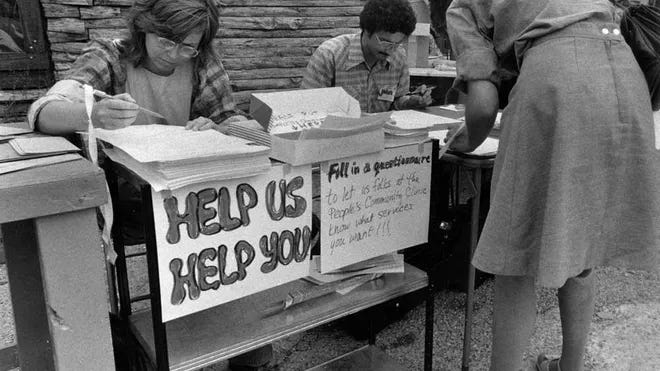Regina Rogoff retired in December from the People’s Community Clinic where she had been CEO since 2003. Originally the People’s Free Clinic, which opened in 1970 in the basement of a downtown church, the People’s Community Clinic is now a federally qualified health center and an Austin icon.
Regina Rogoff has made a mighty contribution to the fine folks who live in the Austin community.
Before her Community Clinic times, she managed the Legal Aid Clinic in Austin. Legal Aid is another sterling example of community building in Austin.
PHIT produced a documentary on THE RAG in which the community clinic is discussed. PHIT has also produced a documentary on Legal Aid in Austin. This substack will cover that episode in the next post.
PEOPLE’S COMMUNITY CLINIC.
“We need to create our own community. Build a world that we are comfortable with.”
The People’s Community Clinic started in 1970 as the Free Clinic.
Around the turn of the 1970, the New Left and the counterculture movement pivoted away from anti-war activity and toward institutions that would create a local support network and community development.
Nixon had won the election and he clearly wasn’t interested in ending the stupid Vietnam war anytime soon. The FBI began systematically infiltrating and disrupting activist groups.
It was time to circle up and create some new ways of living. The Austin community was particularly adept and prolific at this cultural undertaking.
Co-ops were started. Food co-ops, housing co-ops, gas co-ops, automotive co-ops, buying groups, free universities, free newspapers, co-op daycares, and, must I say it, music parlors for the people. Hippie entrepreneurialism. Some say this is what made Austin weird. Maybe, maybe not. Who cares. Whatever happened made Austin a livable city, an attractive city, a fun city for creative people.
The Free Clinic started out as free consultations at the Congregational Church on Guadalupe Street just across from the University of Texas campus. Held once a week, the line wrapped around the building. It was staffed by volunteer interns and nurses.
There was definitely a need for medical services in the community, and the Free Clinic expanded to more days. The Clinic was always short of money. Fundraisers and concerts were held and successful grants were written. It somehow kept afloat and the People’s Free Clinic has continued to this day, although now it is called People’s Community Clinic.
In the early days, the only way to learn about it was word of mouth and reading the RAG.
The Austin Free Clinic was not the first Free Clinic in the nation. The first free clinic was established in Haight-Asbury in 1967. Others in California followed, with Austin not for behind the curve.
When PHIT started researching free clinics, we ran across a dissertation written a few years back on the Los Angeles free clinic, by Rebecca Baird. She had a great analysis.
“The free clinics emerged from a long history of social reform movements and, more immediately, out of the 1960s counterculture and New Left, with the first clinic opening in 1967 in San Francisco. While the clinics were free of monetary cost, they were also, more importantly, free of judgment and bureaucratic red tape, offering equitable health care, legal, employment, and mental health services to disadvantaged and marginalized groups of society; this included drug users, runaways, “hippies,” and others who often found mainstream services to be an unviable option.”
She also had some advice for folks involved in movement politics.
“One major drawback in researching such a localized grassroots organization is a lack of written and archived sources relating to them. Most of the clinic documents remained at the clinics and were often either lost or thrown out over the past fifty years. Access to documents such as board meeting minutes or clinic-specific ephemera is thus especially scarce.””
She had to track her sources down one by one and interview them.
Folks…This is what PHIT has been doing for 50 years. Collecting oral history. Mining what archives there are. It ain’t easy. But it is necessary in order to tell our history.
Alice Embree, adjunct researcher for PHIT, has been on a mission for the last decade to get activists to archive their material. If this is not done, that history will be lost and lost forever. Our history, the people’s history won’t be told. It is rarely told anyway in classroom textbooks, but in forums like this, we can reclaim the people’s history.
So support us.
Talk your friends into donating their archives to depository institutions.
And subscribe to this substack and Alice’s substack.
Speaking of which, we archived an oral history of Legal Aid of Austin. And Regina Rogoff is one of the interviewees. She was manager of Legal Aid before she moved on the People’s Community Clinic.
Next post will be a summary of our talk with Regina Rogoff, a People’s Hero.






Happy to say that I was part of the food co-op movement back then where we moved in one case from a food coop on weekends to a public store open to the public -
Woody Hills. Good memories.